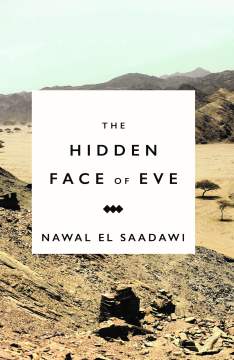
Additional Information
Book Details
Abstract
This powerful non-fiction account of the oppression of women in the Muslim world remains as shocking today as when it was first published, more than a quarter of a century ago.
Nawal El Saadawi writes out of a powerful sense of the violence and injustice which permeated her society. Her experiences working as a doctor in villages around Egypt, witnessing prostitution, honour killings and sexual abuse, including female circumcision, drove her to give voice to this suffering. She goes on to explore the causes of the situation through a discussion of the historical role of Arab women in religion and literature. Saadawi argues that the veil, polygamy and legal inequality are incompatible with the essence of Islam or any human faith.
The Hidden Face of Eve remains a classic of modern Arab writing.
Nawal El Saadawi is an internationally renowned writer, novelist and fighter for women’s rights both within Egypt and abroad. She holds honorary doctorates from, among others, the universities of York, Illinois at Chicago, St Andrews and Tromso as well as Universidad Nacional Autónoma de México. Her many prizes and awards include the Premi Internacional Catalunya in 2003, the Council of Europe North–South Prize in 2004, the Women of the Year Award (UK) in 2011, the Sean MacBride Peace Prize (Ireland) in 2012, and the French National Order of Merit in 2013. Her books have been translated into over forty languages worldwide. They are taught in universities across the world.
'The leading spokeswoman on the status of women in the Arab world'
The Guardian
'A harrowing exposé of the abuse of women in the Arab world'
London Review of Books
'The Arab world's leading feminist and iconoclast'
Fedwa Malti-Davis
‘Nawal El Saadawi has become something of a heroine for many young Arab women … a cry from the heart.’
MESA Bulletin
‘Nawal El Saadawi speaks directly on behalf of many women in the Third World and the daily struggles they face.’
West Africa
‘The most recognisable name in Egyptian and Middle Eastern feminism … poignant, penetrating yet simple.’
Library Journal
Table of Contents
| Section Title | Page | Action | Price |
|---|---|---|---|
| Front Cover | Front cover | ||
| More Praise | I | ||
| About the Author | III | ||
| Title Page | V | ||
| Copyright | VI | ||
| Dedication | VII | ||
| Contents | IX | ||
| Foreword by Ronak Husni | XI | ||
| Preface to the English Edition | XVII | ||
| Introduction | 1 | ||
| Part I: The Mutilated Half \r | 15 | ||
| 1:\r The Question That No One Would Answer | 17 | ||
| 2: Sexual Aggression Against the Female Child\r | 26 | ||
| 3: The Grandfather with Bad Manners \r | 33 | ||
| 4: The Injustice of Justice\r | 39 | ||
| 5: The Very Fine Membrane Called ‘Honour’ | 51 | ||
| 6: Circumcision of Girls \r | 67 | ||
| 7: Obscurantism and Contradiction\r | 89 | ||
| 8: The Illegitimate Child and the Prostitute\r | 102 | ||
| A Legally Sound Marriage Contract | 105 | ||
| Affiliation Through Legalized Adultery | 108 | ||
| Confession or Acknowledgement of the Man | 109 | ||
| Trustworthy Witnesses | 110 | ||
| 9: Abortion and Fertility\r | 127 | ||
| 10: Distorted Notions About Femininity, Beauty and Love\r | 149 | ||
| Part II: Women in History\r | 185 | ||
| 11: The Thirteenth Rib of Adam\r | 187 | ||
| 12: Man the God, Woman the Sinful\r | 209 | ||
| 13: Woman at the Time of the Pharaohs\r | 220 | ||
| 14: Liberty to the Slave, but Not for the Woman\r | 233 | ||
| Part III: The Arab Woman\r | 253 | ||
| 15: The Role of Women in Arab History\r | 255 | ||
| 16: Love and Sex in the Life of the Arab\r | 270 | ||
| 17: The Heroine in Arab Literature\r | 314 | ||
| Part IV: Breaking Through\r | 341 | ||
| 18: Arab Pioneers of Women’s Liberation\r | 343 | ||
| 19: Work and Women\r | 374 | ||
| 20: Marriage and Divorce\r | 393 | ||
| An Afterword | 427 | ||
| Notes | 431 | ||
| Back Cover | Back cover |
